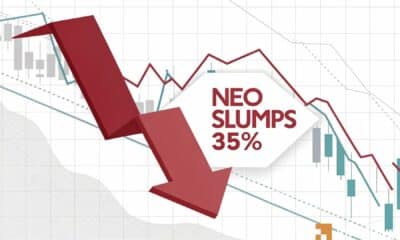OKX’s $504 mln AML fine – Is there a shift in U.S. crypto regulation?

- OKX fined $504 million for violating U.S. anti-money laundering laws.
- The SEC dropped cases against Robinhood and OpenSea, signaling a focus on non-compliant foreign entities over domestic firms following U.S. rules.
Seychelles-based cryptocurrency exchange OKX has pleaded guilty to violating U.S. anti-money laundering (AML) laws and has agreed to pay over $504 million in penalties.
The settlement includes $420.3 million in criminal forfeiture and an $84.4 million criminal fine following years of illegal operations targeting U.S. customers without proper regulatory registration.
A seven-year pattern of illicit activity
According to Acting U.S. Attorney Matthew Podolsky, OKX’s violations spanned over seven years, facilitating over $5 billion worth of suspicious transactions linked to criminal proceeds.
He emphasized the gravity of the offenses, pointing out that the company had knowingly violated AML laws and failed to implement safeguards designed to prevent criminal abuse of the financial system.
“Today’s guilty plea and penalties emphasize that there will be consequences for financial institutions that avail themselves of U.S. markets but violate the law by allowing criminal activity to continue.”
The FBI also played a crucial role in the investigation.
Assistant Director James E. Dennehy emphasized the severity of OKX’s misconduct, stating,
“For years, OKX flagrantly violated U.S. law, actively seeking customers in the United States—including here in New York—and even going so far as to advise individuals to provide false information to circumvent requisite procedures.”
How OKX circumvented U.S. regulations
Despite having an official policy banning the U.S.-based users, OKX covertly sought U.S. retail and institutional customers.
From 2018 to early 2024, American clients generated over $1 trillion in transactions through OKX, contributing hundreds of millions in trading fees.
Evidence presented in court revealed that OKX employees advised U.S. customers on how to bypass regulatory checks. In one instance from April 2023, an OKX employee told a potential U.S. user,
“I know you’re in the US, but you could just put a random country and it should go through. You just need to put Name, nationality, and ID number. You could just put United Arab Emirates and random numbers for the ID number.”
Even after implementing a Know Your Customer (KYC) process, OKX reportedly continued to allow trades without verifying identities, enabling users to sidestep controls through VPNs and “non-disclosure brokers.”
OKX’s response and future compliance efforts
In a public statement, OKX’s parent company, Aux Cayes FinTech Co. Ltd., acknowledged “legacy compliance gaps” but emphasized that the number of affected U.S. users made up a small fraction of its global customer base.
The company stated,
“There were no allegations of customer harm, no charges against any Company employee, and no government-appointed monitor as part of the settlement.”
Changes in regulation?
OKX’s case comes amid a wave of regulatory actions aimed at tightening control over cryptocurrency platforms.
Within days of OKX’s settlement, two other high-profile crypto investigations concluded with markedly different outcomes—raising questions about whether U.S. regulators are shifting their focus.
Robinhood Crypto announced that the SEC had closed its investigation with no enforcement action. Dan Gallagher, Robinhood’s Chief Legal Officer, welcomed the decision, stating,
“We applaud the staff’s decision to close this investigation with no action.”
In a similar vein, the SEC also dropped its investigation into OpenSea, a major NFT marketplace. The platform’s CEO, Devin Finzer, described the closure as a victory for digital asset creators.
The timing of these cases suggests a possible shift in the SEC’s regulatory strategy.
While Robinhood and OpenSea emerged unscathed, the aggressive stance against OKX could signal that U.S. authorities are focusing on non-compliant foreign platforms with a substantial U.S. user base.






